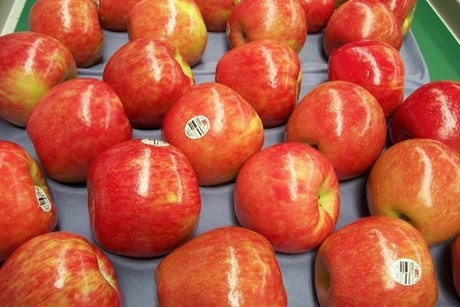 ts a time when Honeycrisp apple fans must go without their coveted fruit, but a Minnesota company is about to change that. A Honeycrisp crop is en route this week to U.S. grocery stores from Chile, where growers have spent the past decade perfecting the insanely in-demand apple variety.
ts a time when Honeycrisp apple fans must go without their coveted fruit, but a Minnesota company is about to change that. A Honeycrisp crop is en route this week to U.S. grocery stores from Chile, where growers have spent the past decade perfecting the insanely in-demand apple variety.Westcott Agri Products Inc. of Elgin, Minn., has exclusive rights for the Chilean production of the Honeycrisp, and is working with local contract growers to bring the apples north. "Honeycrisp is the No. 1 desired apple in America," said Don Roper, vice president of sales and marketing for Westcott Agri Products. "We will be the first company that provides a year-round Honeycrisp supply to our retail partners."
The reward for Honeycrisp apples is lucrative. They can fetch $100 a case for wholesale, compared to $30 for Gala apples and $20 for Braeburn, Roper said.
The University of Minnesota developed the Honeycrisp apple. Its patent from 1988 has expired, but it still has rights over international production. The breeder of the Honeycrisp apple is U of M research scientist David Bedford. Bedford recently traveled to Chile to see the farms and try the apples.
Bedford is concerned that some domestic and international growers aren't properly caring for the variety and may harm public perception of the apple. They're difficult to grow, but Bedford said Chilean growers have done a good job so far. "The Chilean growers are a sharp group that has faced the challenges so far," Bedford said. "The ones I tried down there are good. Slightly different than ours, but still in the good category."
Apple orchards are in a mad dash all over the world to plant Honeycrisp trees, both Roper and Bedford said. The U.S. crop has reached 7 to 8 million bushels a year and it's continuing to grow at a rabbit's pace.
In the southern hemisphere, only Chile and New Zealand have produced apples for U.S. consumption, but in very small shipments that are gone before anyone even knew they were here. This year's Chilean crop is much larger at 200,000 bushels, but still a drop in the bucket compared to the millions grown in Minnesota, Wisconsin, Michigan, Washington, Pennsylvania, Nova Scotia and Ontario.
As production in the U.S. increases, apple companies are loading them into climate-controlled rooms to preserve them until the late winter months. But southern hemisphere apples would give American apple consumers fresh Honeycrisp all year round.
Wescott plans to ramp up production in Chile. The company already has orchards in Minnesota, Wisconsin and Washington. The company owns packing sheds and markets its own apples and fruit from other orchards through its Honeybear Marketing division. Roper said Wescott is one of the top three or four Honeycrisp growers in the United States.
Locally grown Wescott apples are labeled as Mississippi Valley Fruit Co. Its non-Midwest and international apples are labeled Honeybear.





